|
The Long Road Begins...
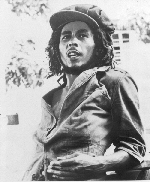 Bob
Marley was born in the parish of St Ann, Nine Miles
in Jamaica, on February 6th 1945. Born to Mother Cedella
and his father Norval Marley. The village of Nine Miles
is a lot like many of the country areas of Jamaica,
where the people work the land for their living, so
from an early age Bob learned the values of nature,
and a respect for the simple things in life that he
would carry with him throughout his time here on earth. Bob
Marley was born in the parish of St Ann, Nine Miles
in Jamaica, on February 6th 1945. Born to Mother Cedella
and his father Norval Marley. The village of Nine Miles
is a lot like many of the country areas of Jamaica,
where the people work the land for their living, so
from an early age Bob learned the values of nature,
and a respect for the simple things in life that he
would carry with him throughout his time here on earth.
Captain Norval Marley, (Bobs father) was an English
man who worked as a quartermaster attached to the British
West Indian Regiment, his job involved riding around
on horseback as an overseer of crowns "contingent
lands" in the districts around Roden Hall. Although
Noval was almost 50 years old and Cedella was just turning
18 they became lovers. When Cedella told Norval she
was pregnant by him the two married and Norval promised
to take care of the child.
But the day after they wed Norval left for a new job
in Kingston. Norval visited Cedella twice while she
was pregnant and once more shortly after Cedella give
birth. He had told Cedella that his mother in Kingston
was mad at him when she heard that he had gotten a young
black country girl pregnant and had married her, so
much so that she disinherited him; "His whole family
where very against him, because of me." says Cedella.
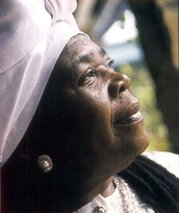 |
|
Cedella Booker
|
Cedella took care of Bob in the countryside (were he
is remembered with particular fondness) until he was
almost six years old, when Bobs father asked if Bob
could go to Kingston were he would be provided with
better schooling. Cedella finally agreed, and a young
Bob was sent to Kingston.
Cedella wrote several times to Norval in Kingston asking
how Bob was getting on at his new school. Norvel had
written back saying that Bob was doing well at his new
school. Six months past and Cedella wrote to Norval
saying she was coming to Kingston to see her son. Norval
replied and said that Bob had gone on a vacation with
his teacher and there was no point in coming to Kingston,
so Cedella accepted the story (she later found that
this was untrue) but after a year had passed with no
word from Norval, Cedella began to worry.
One day a friend of Cedella's told her that she had
seen Bob on the streets of Spanish Town Road in Kingston.
She said that he had asked about his mother and asked
for her to come and look for him.
After hearing this Cedella went to Kingston to find
her son. When Mother and son were reunited Cedella found
that Bobs father had left Bob (who was now 7) to look
after a sick, elderly woman who was a friend of Norval's
family. She said that Bob had been a great help to her,
fetching groceries and coal. But Bob had said that he
wanted to go home with his mother so the two returned
to Nine Miles.
Bob adjusted well back to country life, although he
had refused to read any more palms for customers at
his mothers' shop, which he had started to do before
he had left for Kingston. According to customers he
was very accurate. He said he didn't read no more palms,
"I'm singing now".
Three years after they had settled back in Nine mile's
Cedella learnt that Noval had died in 1955 from either
malaria or cancer, Bob was now 10. Bob had grown up
angry with his father as he felt that he had abandoned
him and his mother. Later that same year Cedella (like
most Jamaican country girls) wanted to explore the bright
lights of the city, and the opportunity came when her
brother who lived in Kingston was emigrating to England
asked if Cedella would look after his house for him.
Cedella grabbed the opportunity and left for Kingston,
leaving Bob with his grandfather Omeriah were Bob took
responsibility for his Grandfathers goats.
Two years past and Cedella wrote a letter to Omeriah
asking to send Bob to Kingston since she had finally
gotten a place were he could stay with her.
TOP
Trench Town Rock...
 |
|
The 3 original Wailers: (L to
R) Bunny Livingstone, Bob Marley, Peter Tosh
|
It was in an area of Kingston called Trench Town that
Bob met a boy by the name of Bunny (born Neville O'Riley),
his family shared the same yard as Bob and his mother.
The two boys became close friends who began an interest
in singing. They practiced every evening after school
with Bunny making a homemade guitar from various pieces
of scrap.
By the age of 15 Bob had began to lose interest in
school and was concentrating on his singing, so his
mother found him a job in a welders shop.
At this point Bob realized that he could go no futher
as a singer without someone to teach him some more about
the business. He found such a teacher by the name of
Joe Higgs who held singing lessons for anyone interested
in learning the trade.
Higgs lived in the same yard as Bob and Bunny, (just
round the comer) in Trenchtown. Higgs was himself a
Rastafarian and shared his knowledge with Bob about
the little known (to most) way of life of its followers.
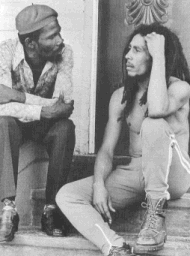 |
Bob with his friend
and teacher, Joe Higgs
|
It was at these lessons that Bob and Bunny met another
youth by the name of Peter McIntosh. The three boys
soon got together and were calling themselves The Wailing
Wailers. They soon found that they sounded very well
together and with Higgs teaching them they realized
that they were on the road to success.
An accident at the welders' shop that Bob was working
at (in which a piece of metal was lodged in Bobs eye)
gave Bob the final push he needed to go into the music
business full time.
Bob finally got the chance to audition for a record
producer by the name of Leslie Kong at his shop (Beverlys
record shop). Bob sang a song called "Judge Not"
which he and Joe Higgs had written. Kong liked what
he heard and a month later a 45rpm single of the song
was released in Jamaica. Although the record didn't
sell well, it was the start of Bob musical career. Bob
was only 16 at the time.
By 1962 Cedella had an affair with Bunny's father,
Mr Taddy, and had a daughter named Pearl Livingston,
both Bob and Bunny's half sister. Bob was almost 17
when she was born. Life at home in trenchtown became
different with a baby in the house. By the end of 1962
Cedella moved to Willmington Delaware, USA, leaving
Bob and Pearl with her sister Enid, which lasted till
Enid took Pearl and decided to return to the countryside
of St Ann. Bob moved in with Mr Taddy and was part of
the family until Bob had a disagreement with a girlfriend
of Mr Taddy's and by the age of 18 Bob was living on
the steets of Kingston. He was homeless.
TOP
Cold ground was my bed last night...
By early '63 Bob had found a place to sleep in the
corner of a kitchen on First Street. Another friend
of Bobs shared the room with him; his name was Vincent
Ford who was confined to a wheelchair by a crippling
illness. The two boys often found themselves without
any food and would often sing songs together to cover
the uncomfable rumblings of their stomachs. Despite
the difficulties Bob faced he still persued his dreams
of becoming a singer and still attended the lessons
at Joe Higgs's yard, along with many others with a similar
interest.
The next hit the Wailers group had was with a song called
"Simmer Down" which went to no 1 on the JBC
chart in January 1964. The song itself was a way of
telling the rudeboys of Jamaica to "cool down".
It was recorded at Coxsone Dodd's studio named Studio
1.
By the time "Simmer Down" had become a success
in Jamaica, Bob had been homeless now for a period of
six months, fortunately after the success of the song
Dodd give Bob a room to sleep in at the back of the
studio, and for the next two years it was to be Bob's
home.
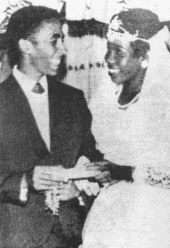 |
Bob and Rita on
their wedding day
|
On the way to rehearsals at Coxsones studio the trio
would pass by a girl's house by the name of Rita Anderson
later known as Rita Marley. Rita lived with her Uncle
and Auntie; she would see Bob and the others as they
passed by. Rita had her own group of singers called
the Soulettes, consisting of her, her friend Marlene
and her cousin Constantine. In time the group of girls
got an audition at Coxsone's studio, Coxsone liked what
he heard and and agreed to to take the girls on as trainees.
Coxsone assigned Bob to act as the group's manager and
to rehearse them.
After several months of rehearsals Bob became attracted
to Rita; unknown to her at that point as Rita saw Bob
as a father figure type, who seemed too serious about
the rehearsals to possibly take an interest in her,
So when one day Bunny told Rita that Bob was in love
with her, Rita was shocked.
A love affair between the two soon developed, and the
two were married on February 10 1966. The next day like
his father, Bob left his bride and headed off to find
work in Delaware (to join his mother) in the hope of
making enough money to start a record label of their
own back in Jamaica when he returned.
TOP
Rastafari...
By 1966 Bobs mother had settled well in Delaware with
her own home and a little grocery shop in Willmington.
"How come you marry and you never tell me?"
Cedella asked.
Bob told her that it wasn't his intension to marry
just then but Coxsone had told him to marry his girlfriend
Rita before he left for America so it would be easier
to send for her if he wanted to.
In the 4 years that they were apart, the Christian
youth that Cedella had left behind in Trench Town had
been exposed to the Rastafarian religion, which was
difficult for Cedella to understand being a fundamentalist
Christian, she simply didn't want to know anything about
Haile Selassie to whom the Rasta's consider the "Almighty
Living God " on earth.
"Me all is
a Rasta from creation. Rasta is our thing. Is not an
influence, Rasta is everything... Rasta the first!" For Cedella Rastas were dread lock wearing people
who didn't work, didn't go to Church and smoked ganja
all day long. Bob tried to explain to his mother about
the concept of Rasta but Cedella didn't want to know.
By the end of the year Bob decided he had enough of
the cold winter weather in Delaware and decided to return
to the climate he was used to in Jamaica. At first Cedella
was upset with the idea of Bob returning to Jamaica
and turning Rasta, little did she know that in later
years she too would turn to the Rasta faith.
For the 7 months that he stayed in Wilmington, Bob worked
hard trying to earn enough money to get a little record
company off the ground when he went back to Jamaica.
By October 1966 Bob returned to Jamaica.
While Bob was in Delaware with his mother, Haile Selassie
had paid a state visit to Jamaica, where he was greeted
at the airport by thousands of Jamaicans. To many he
was a man of great respect and admiration but to the
Rastas he was a living God, the King of Kings and Earths
Rightful Ruler.
The Wailing Wailers had continued to record for Coxsone's
studio in Bob's absence. They recorded several hits
for Coxsone with both Bunny and Rita having big hits
with "Rude Boy" and "Pied Piper"
respectively. Although the group had recorded many hits
for Coxsonne (at least 20 hit singles) they felt that
they weren't getting paid enough for their work with
him.
TOP
Wailin' Soul...
Eventually, the Wailers decided to leave Coxsone and
form their own label, using the money Bob had saved
while working in Delaware. The Wailers called there
new label Wailin' Soul Records, but despite having had
some hit's which where being played at dance halls and
sound systems which toured the island, (Songs like "Nice
Time", "Hypocrites" and an early version
of "Stir it up") the group where not getting
any much needed airplay by the radio stations.
Realistically the Wailers were too inexperienced to
run their own label. Wailin' Soul records went quietly
out of business by the end of 1967.
By 1968 Bob was learning the way of Rasta through his
friend and teacher Mortimer Planno. It was at a meeting
of "groundations," (prayer meetings, that
wound last for hours) that Bob was introduced to a man
by the name of Johnny Nash. Johnny had set up a record
company with another man called Danny Sims and was himself
well known in the US (he appeared in two Hollywood films
and had recorded five albums, which had sold well).
After hearing Bob sing and Rita harmonizing with him
Nash and Sims knew they wanted to work with the group.
Sims signed the Wailers to a contract with JAD and Cayman
Music, Sims publishing company Despite recording some
80 songs for Sims which provided The Wailers with some
badly needed income, it did little to futher their career
and somewhat shackled them creatively.
During this time Bob (as he had predicted) had begun
to work with Leislie Kong recording some ten songs including
Caution, Do it twice and Soul Shakedown Party. But when
Kong released an album of songs the Wailers had recorded
for him (10 in all), Kong said he would name it (to
their extreme anger) "The Best of the Wailers".
Bunny shouted to Kong: "How can you know the
best of someone's work when we have such a long trod
ahead of us? If this is our best to you, it must mean
that you are at the end of your life."
Kong released the album as he had planned. A year later
Kong dropped dead of a heart attack, after complaining
he wasn't feeling well. He was only 38.
By the Spring of '69 Bob returned to the US to live
with his mother and find work in Delaware. Bob had worked
at several different jobs including a job at the local
Chrysler factory, spending his days on a truck assemble
line. Seven years later Bob had a song called "Night
Shift" based on his experiences.
Bob returned to Jamaica in the autumn of the same year,
and although he wasn't much wealthier than when he left,
he had a lot of new songs and ideas.
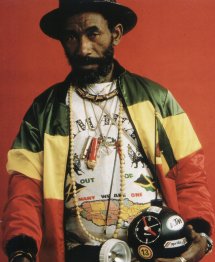 |
Lee 'Scratch' Perry
|
The Wailers next producer was an old friend from their
days with Coxsone Dodd. His name was Lee 'Scratch' Perry.
Perry had his own group of mussians called the "Upsetters"
who worked with the Wailers; the result was magical,
with many Wailers fans regarding these recordings as
the best the band ever made, songs such as "Duppy
Conquer", "Small axe", "Kaya",
and "Lively up yourself".
Two of the Upsetters band consisted the Barret brothers,
Aston "Family Man" Barret on bass guitar and
his younger brother Carlton on drums; they had long
wanted to hook up with the Wailers.
"The Wailers were the best vocal group, and I
group was the best little backing band at the time,
so we say why don't we just come together and smash
the world?" said Family Man. But despite the brilliance
of these recordings, Perry sold them for distribution
in Great Britain and the US.
Unfortunately as Bunny said "We have never made
one dime from any of them. Perry refused to give us
our money when it came time to collect". Although
Marley would work with Perry again the partnership was
broken.
By the early summer of 1971 Bob recorded a hit song
that opened a lot of doors in Jamaica musically, the
song was "Trench Town Rock" finally the Wailers
were getting the airplay they needed and the recognition
they deserved.
"One good thing about music, when it hits you
feel no pain." The song topped the Jamaican charts for 5 months.
In the wake of The Wailers success Danny Sims arranged
for Bob to travel to Sweden to work on a soundtrack
of a proposed film staring Johnny Nash. In Sweden Bob
stayed close to the hotel where he was staying (trying
to avoid the bitter cold) writing songs for the soundtrack
of the film, but it proved to be a waste of time as
the film sank without trace days after its release.
TOP
Island Records...
For the next venture Marley was sent to England where
he was to be joined by the other Wailers where they
were to back Nash in a concert tour, but this too (Like
many of Sim's ventures) fell apart. The Wailers soon
found themselves in England (after Nash and Sims ran
off to New York to try and rescue Nash's latest release
there) with no money, no work and no way off getting
back to Jamaica. The group were desperate.
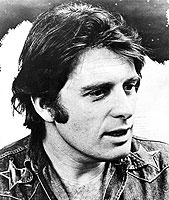 |
Chris Blackwell
|
By December '71 with few options left Bob decided to
go to the studios of Island Records and asked to see
the boss, Chris Blackwell.
Chris Blackwell was familiar with the Wailers music,
as he had distributed some of their songs in England
for their old producer Lee Perry. He agreed to advance
the group money to make an album's worth of songs for
him (approx £8000). Although friends told Chris
he might as well kiss the money goodbye, as he would
never see it again, Blackwell felt he should take a
chance on the trio.
The group headed back to the familiar climate of Jamaica
and began to work on the album which would be know as
"Catch A Fire" .
TOP
To read part 2 of this biography of Bobs Marleys life,
CLICK HERE
|

 Bob
Marley was born in the parish of St Ann, Nine Miles
in Jamaica, on February 6th 1945. Born to Mother Cedella
and his father Norval Marley. The village of Nine Miles
is a lot like many of the country areas of Jamaica,
where the people work the land for their living, so
from an early age Bob learned the values of nature,
and a respect for the simple things in life that he
would carry with him throughout his time here on earth.
Bob
Marley was born in the parish of St Ann, Nine Miles
in Jamaica, on February 6th 1945. Born to Mother Cedella
and his father Norval Marley. The village of Nine Miles
is a lot like many of the country areas of Jamaica,
where the people work the land for their living, so
from an early age Bob learned the values of nature,
and a respect for the simple things in life that he
would carry with him throughout his time here on earth.





